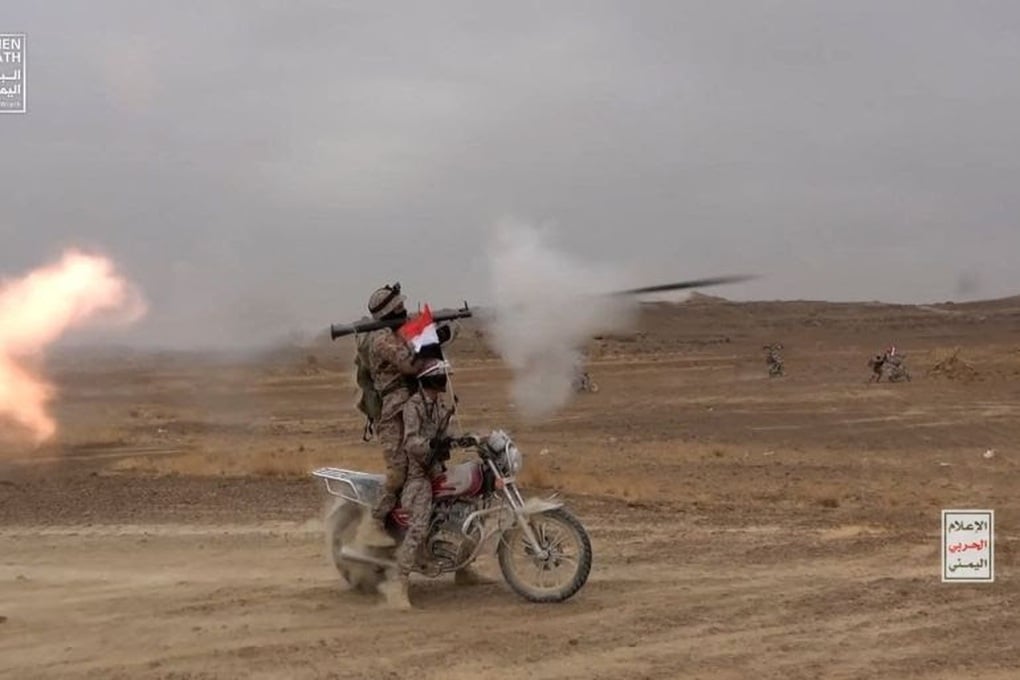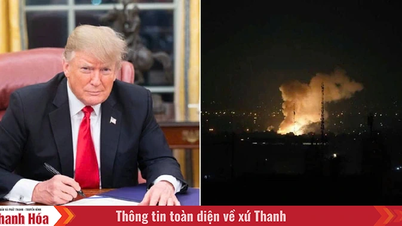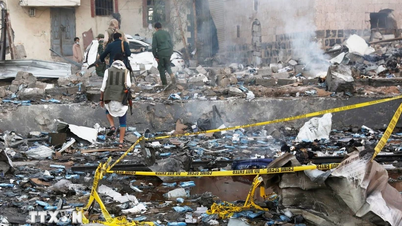
A Houthi member fires a rocket-propelled grenade during a military exercise near Sanaa, Yemen on October 30 (Photo: Reuters).
As Israel continues to attack Gaza and Hamas receives only modest armed support from Lebanon's Hezbollah group, another ally has suddenly stepped in to support the Palestinian forces.
Just days ago, experts predicted that the US Navy's successful interception of all missiles fired by Houthi forces in Yemen toward Israel would prevent them from wasting artillery shells in the future.
But this assessment was proven wrong when the Houthis launched cruise missiles and UAVs at Israel.
The Houthis have never had much of a chance of hitting anything more than 2,000km away while Israel is at the limit of Yemen's longest-range missiles.
And to reach Israel, Houthi missiles must first evade US Navy ships patrolling the area that could shoot them down, and then Israeli Navy missile escorts based in the Red Sea.
The Houthi forces are certainly aware of these daunting limitations and know that even if they can overcome a few hurdles, they can only inflict symbolic damage when targeting Israeli targets.
The question is, knowing this reality, why do the Houthis still launch missiles and unmanned aerial vehicles (UAVs) to attack Israel?
The goal is elsewhere
The answer may be simple: by firing cruise missiles, they are not fighting a military force but a “ political war”. And the group’s real target is not Israel but its arch-enemy: Saudi Arabia.
According to experts, Houthi missiles and drones may not cause much damage to Israel, but they will complicate regional diplomacy , especially for Saudi Arabia.
To understand this, it is necessary to look back at the history of Yemen and the rivalries in the Arabian Gulf region.
Yemen underwent a revolution in 1962, ending centuries of Zaidi Shiite Muslim clerical rule. This changed the country profoundly. The predominantly Shiite northern highlands declared the pro-Western republic of Yemen while the Sunni south established the People's Democratic Republic of Yemen.
After a series of civil wars, by 1990 a deep rift had emerged between a unified Yemen and most Arab states. Yemen opposed the intervention of non-Arab states to expel Iraqi forces from Kuwait after President Saddam Hussein attacked its smaller neighbor.
Saudi Arabia, which supported the US military intervention in Iraq, responded by expelling nearly 1 million Yemeni workers from the kingdom. For Yemen, already a poor country, this meant further economic hardship.
Meanwhile, the long-running struggle for influence in the Middle East, between Saudi Arabia and Iran, found a new stage in Yemen, where a full-scale civil war broke out in 2014.
As of 2022, the conflict has somewhat eased, but Yemen still has two competing “governments,” neither of which has full control of the country.
One is the Iran-backed National Salvation Government, headquartered in the capital Sanaa, and controlling much of the territory. The other “government” nominally resides in the southern port of Aden, but its members are mainly based in Riyadh and have always claimed to be the sole legitimate rulers.
Surprisingly, Riyadh and Tehran responded to China and Iraq’s mediation efforts in March and re-established diplomatic relations after seven years. It is likely that both sides want to ease tensions in Yemen, but also want to use this period of calm to pursue their other strategic interests.
Saudi Arabia had grand plans to normalize relations with Israel. But the coordinated Hamas attack on Israel on October 7th put Riyadh’s efforts in jeopardy. Within days, Saudi Arabia reportedly informed the US that it was halting plans for a proposed deal with Israel that Washington had been trying to broker.
While Gaza is under attack, the only armed support for the Palestinians has come from Hezbollah, more or less. The Houthi missile attack on Israel on October 19 seemed like a one-off. But repeated attacks on a larger scale earlier this week, while completely ineffective, seem to be establishing a reality: a militant group is slowly getting involved in the Israel-Hamas conflict.
Meanwhile, the White House said last week that "Saudi Arabia has indicated a willingness to move forward" toward a normalization deal with Israel. However, Riyadh has not confirmed the White House's statement.
However, if the White House's claim is confirmed, the Houthis' latest missile launches will make it more difficult than ever to make that plan a reality.
Source


![[Photo] General Secretary To Lam, Secretary of the Central Military Commission attends the 12th Party Congress of the Army](https://vphoto.vietnam.vn/thumb/1200x675/vietnam/resource/IMAGE/2025/9/30/9b63aaa37ddb472ead84e3870a8ae825)

![[Photo] Panorama of the cable-stayed bridge, the final bottleneck of the Ben Luc-Long Thanh expressway](https://vphoto.vietnam.vn/thumb/1200x675/vietnam/resource/IMAGE/2025/9/30/391fdf21025541d6b2f092e49a17243f)
![[Photo] President Luong Cuong receives President of the Cuban National Assembly Esteban Lazo Hernandez](https://vphoto.vietnam.vn/thumb/1200x675/vietnam/resource/IMAGE/2025/9/30/4d38932911c24f6ea1936252bd5427fa)
![[Photo] The 1st Congress of Phu Tho Provincial Party Committee, term 2025-2030](https://vphoto.vietnam.vn/thumb/1200x675/vietnam/resource/IMAGE/2025/9/30/1507da06216649bba8a1ce6251816820)
![[Photo] Solemn opening of the 12th Military Party Congress for the 2025-2030 term](https://vphoto.vietnam.vn/thumb/1200x675/vietnam/resource/IMAGE/2025/9/30/2cd383b3130d41a1a4b5ace0d5eb989d)
































































































Comment (0)